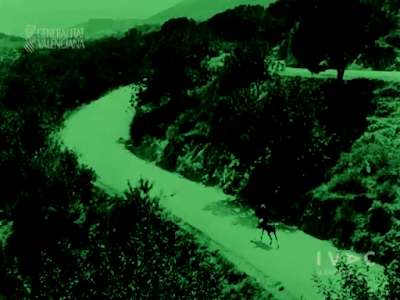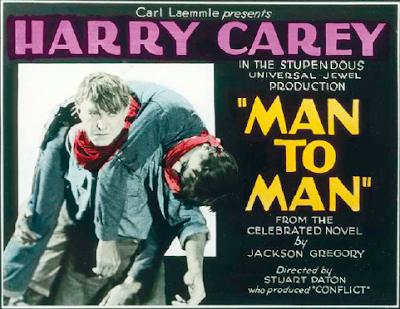And so we came, by planes and boats and trains, back to
the home of silent film festivals, Pordenone North of Venice and a very fine
town indeed. My first time here since 2019 having been stymied by the lockdown
and then by C-19 itself but not this year in spite of attempts by wild
publishing horses to keep my mired in gobbledegook: get thee behind me Croydon!
Before the biggest of finishes we were served a reminder of
the importance of this festival, breadth, rarities, new discoveries and men on
horseback. Star of the Day was Pauline Frederick in The Love That Lives (1917)
which had some foreshadowing of The Crowd and Stella Dallas… Pauline made me
cry in 2019 with Smouldering Fires and she had me welling up again with her
performance in this dramatic tragedy. She had a pair of the most penetrating
eyes in Hollywood and here she looked so much younger as a put upon young
mother who is preyed on by her boss and her drunken husband.
Her transformation by the end would have made even L Gish
baulk at the physicality, she looked thirty years older yet still with enough
love and grit to provide divine inspiration. Philip Carli accompanied with sensitivity
and spirit.
 |
| Pauline Frederick |
Meanwhile, in Ruritania – Part 2 of the GCM’s deep dive
into mythical monarchies – there was some confusion in La reina joven
(1916), a Spanish film – rare to see one of this vintage for me – as a romance
between a Queen and an anti-monarchist went in ways that you might not expect. Said
Anti-Royalist Rolando (Ricardo Puga) bravely rescues the young Queen Alexia (Margarita
Xirgu) after her horse bolts and he throws himself around the beast’s neck to
bring it to a halt… we almost saw it, but the editing was not so brave as the hero.
Anyway, once Alexia fails to die from the shock – the levels
of distress-induced female mortality were so high at this time, someone should
have investigated – things progress in resolutely non-romcom ways, as despite
their romance, neither will change course. Oh, if only there was an evil Archduke
to stir things up and thereby avoid criticism of legitimate political concerns
about the Spanish system of government… Ace accompaniment was from Mauro
Colombis who had fun with all the regal romance and that horsing about.
 |
| Queen Alexia takes to horse |
A horse, a horse, my kingdom or a horse, yelled one
British King according to Shakespeare, but Harry Carey had loads of horses, exactly
when he needed them. Carey’s a handsome cowboy and it’s a treat to see the festival
highlight him in his pomp after only really seeing him in talkies and with his
good friend John Wayne (The Searchers, that final shot… Wayne standing
at the door with his hand holding his arm like Harry used to, magnificent).
Carey’s a fabulous actor and has lots of physical motifs
that indicate concern or casual thoughtfulness, a thumbnail stare here, a pensive
thumb to the lips there… he might well have been studying Asta Nielsen. All of
this plus his ability to fight and act make him a magnetic screen presence and
these three simply whipped by with Stephen Horne riding along with gusto.
Most striking of all was the partially two-strip tinted Man
to Man (1922) directed by Stuart Paton which featured some outstanding
vistas and dynamic action as Steve Packard (Harry C), fights to clear his name,
rescue the family ranch and win the heart of Terry Temple (Lillian Rich). To do
this he must overcome the extreme disapproval of his grandfather, Old Hell-Fire
Packard (Alfred Allen) and his confederate, Joe Blenham (Charles Le Moyne) who
is the wrongest of wrong-uns.
Again, it’s striking how much of the wild western formula
was in place this early with an impressive mass stampede of cattle organised by
the baddies to ruin the ranch and the extended man-to-man combat of the closing
sequence. Then there’s Harry who was rightly lionised by Wayne, he’s the real
deal and I look forward to watching more of his gun-totin’ horseplay as the
week unfolds.
The Divine Voyage (1929) with Antonio Coppola and the
Octuror de France, Gala
I missed this one last year at the BFI and so was
especially keen to see it on the big Verdi screen and with a stunning new score
from Antonio Coppola who conducted a nine-piece ensemble who translated his dynamic
lines and simply gorgeous themes to accompany this magically-real story of hope
and faith in spite of everything from capitalist carelessness to mutinous
muscle men and the cruel sea itself. The music was packed with interest and
recurring themes that are still replaying in my head and all done in the
service of Julien Duvivier’s striking narrative and sumptuous visuals. The
whole village turns out to wave ships off in good hope and to cheer their return,
well the global Pordenone village does the same for works and music like this!
Brava Antonio and the Octuror de France ensemble.
There is so much pleasing late-silent technique on show
from Duvivier in this film – Renoir’s “rigorist poet” in action – with a roving
camera that moves in and out of buildings, follows crews as they race to the
harbour side or to confront wrong-doing. Close ups of locals cast for “face” that
rival Dreyer for impact and rapid cutting that shows the influence of both
Russian and German directors. The locations, Paimpol in Brittany, Louvigny sur
Mer in Normandy and Ermenonville are superbly photographed and edited to create
an impression of a people on the edge, battling unforgiving nature. Were you
watching Michael Powell?
The film’s critique of blind capitalism is one of the
reasons it was heavily censored at the time, and it begins with an act of
desperate revolt when a mariner Kerjean (Henri Valbel) who has defaulted on his
rent, attempts to assassinate unforgiving businessman Claude Ferjac (Henry
Krauss), Ferjac in his chateau. Ferjac runs the town with a callous calculation
and he will push the citizens to the brink before the story is through. Times
is very much money and Ferjac makes it clear to the local mariners that manning
the insufficiently repaired La Cordillère is of far more importance than the
risk to their lives. Captain Jacques de Saint-Ermont (Jean Murat) makes their
case but he knows there’s no way of changing Ferjac’s mind. The meeting between
the boss and the sailors shows the hatred and fear they feel for this man and
the desperate calculations they have to make for their families.
There’s further intrigue with Ferjac’s daughter Simone
romantically attached to Captain Jacques and the two meet in the bay, separated
by a fishing net, both trapped in their relationships with her father who will
listen to no one be it the curate (Louis Kerly) or Jacque’s mother (Charlotte
Barbier-Krauss).
The ship sets sail and includes the last-minute arrival
of a mariner from outside the area, Mareuil played by Thomy Bourdelle who gives
a stand-out muscular performance as the faithless opportunist upon whose
actions so many lives will rest. Simone visits the Curate in his church and
dedicates herself to repainting the frescoes and especially the painting of
Maris Stella, she who is the “Star of the Sea”. Things swiftly go awry on the
voyage as Mareuil decides that stealing the cargo is the way forward – another
heartless capitalist? – and persuades most of the men to revolt, throwing one
unfortunate who refuses into the sea to drown. His group overpowers the captain
and his men, taking control just before the sea, as it was always going to do,
erupts in a storm that would challenge even the finest of ships.
Back on land, the body of the murdered man is found and there’s a harrowing passage as his wife, Jeanne (Line Noro) is told of the news and leads a march to confront the man responsible. Ferjac is busy hosting a lavish dinner party to announce the marrying off of Simone to one of his business contacts, she cannot even hold her glass to toast the depressing nuptials and then Jeanne arrives followed by dozens of the locals who are now convinced that the ship has sunk and there’s only one man to be blamed. It’s a powerful set piece – fake elegance rudely interrupted by anguished poverty.
This is only the narrative entrée though and the Divine
Voyage is yet to really begin… there’s a magical realism at play and faith,
fate and hate will all have their roles as the full story enfolds. Duvivier
maintains not only the pace but also a startling consistency of cinematic
expression throughout as well as bringing out some extraordinary performances.
What a way to end this first day back “home”, as festival
director Jay Weissberg said in quoting his predecessor, David Robinson.
















No comments:
Post a Comment